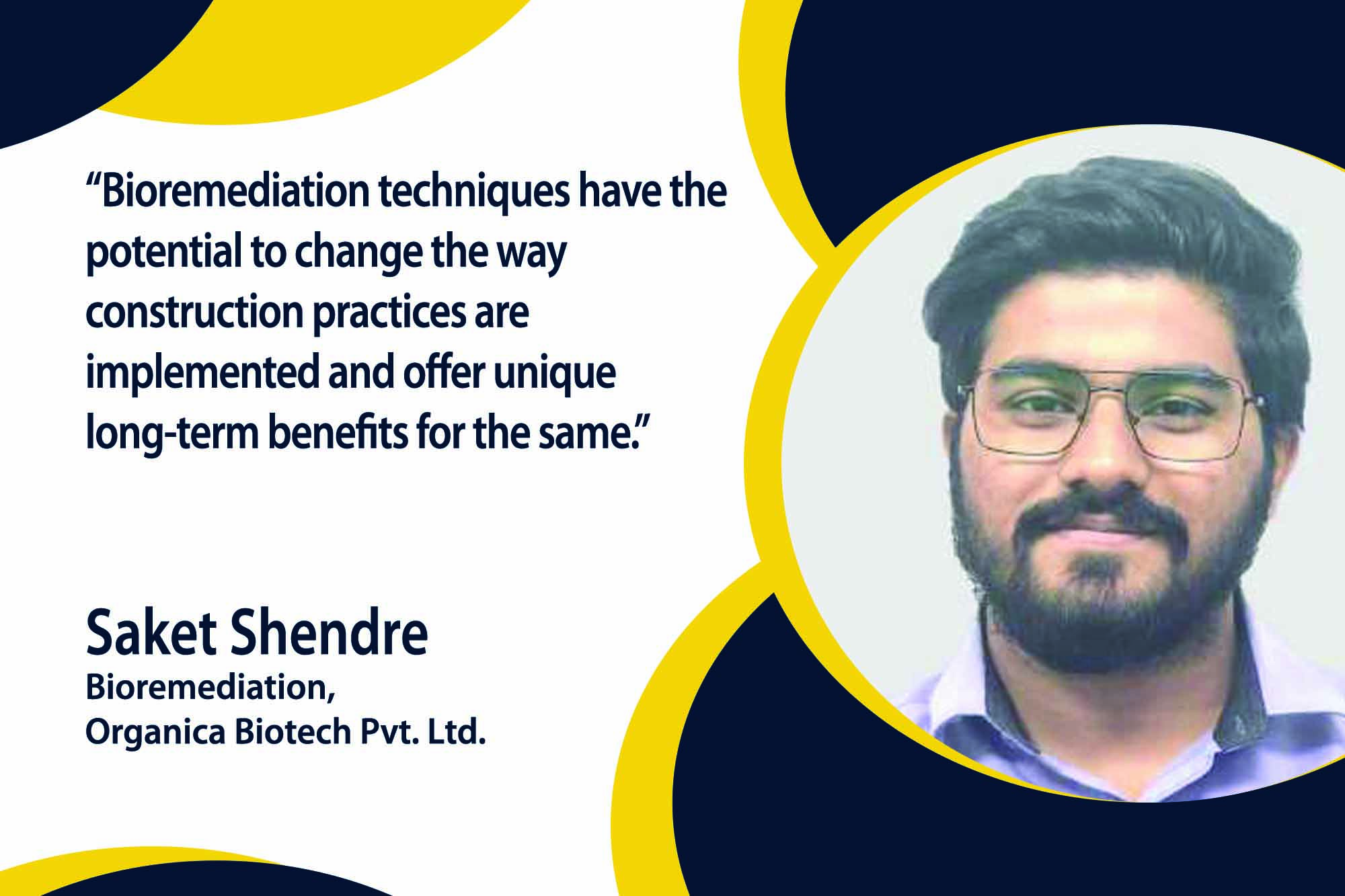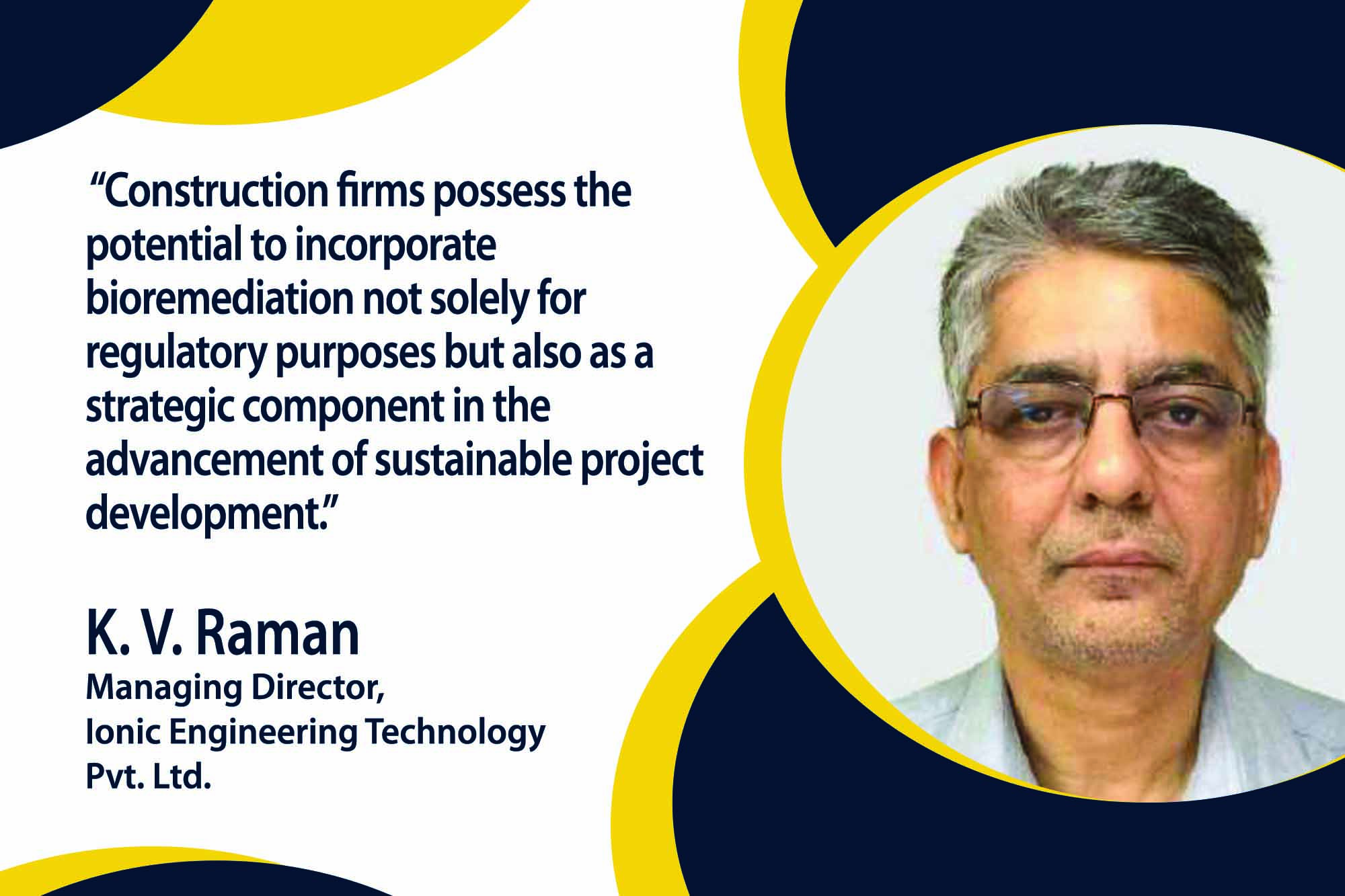A sustainable path for construction water management
By Edit Team | February 8, 2024 3:54 pm SHARE

Explore the field of bioremediation and its significance in managing water in construction. This interview thoroughly explains how biotechnology is transforming the construction business, covering everything from the difficulties faced by construction organisations to the upcoming trends in wastewater treatment.
How do you see the application of bioremediation evolving in response to emerging contaminants in water sources, and how might this impact construction projects?
In the ever-changing landscape of wastewater treatment within the construction industry, bioremediation is a pivotal solution to address the challenges posed by emerging contaminants in water sources. As someone from the bioremediation sector, I foresee a transformative impact as bioremediation technologies can help provide tailored strategies for combating diverse pollutants. As compared to previous decades, the pollution of water sources has become more severe. This calls for an increase in the treatment efficiency to cope with the same. This can be achieved only through the evolution and betterment of bioremediation procedures. Complex pollutants in the water bodies lead to a higher organic and inorganic load in the water. These can cause problems during construction processes and lead to the instability of construction material due to interfering with the chemistry of the process. Thus, bioremediation-based treatment methodologies help tackle complex effluents even with fluctuating and complex parameters, as there is constant evolution in the systems. Navigating the regulatory landscape is a constant challenge for the construction industry, and bioremediation emerges as a proactive and efficient approach to meeting stringent water quality standards and addressing emerging contaminants.
What are the primary challenges in adopting bioremediation technologies in mainstream construction projects, and how can these challenges be mitigated?
The primary challenges in integrating bioremediation technologies into mainstream construction projects revolve around operational and maintenance costs, constriction in space and availability, concern about bioremediation technology’s effectiveness and reliability, and variation in the influences.
At Organica Biotech, we actively tackle these challenges by providing packaged plug-and-play wastewater treatment systems that can be constructed per the space requirement and incoming effluent characteristics. Organic Biotech also invests in robust research and development that keep it a forerunner with a dedicated team of technical experts. The highly skilled experts with 23+ years of experience focus on advancing microbial solutions, exploring pioneering technologies, and conducting in-depth studies to improve wastewater treatment processes’ overall efficiency and sustainability.
How do regional variations in environmental conditions impact the effectiveness of bioremediation solutions?
Regional variations in environmental conditions can lead to fluctuations in microbial performance; thus, one needs to choose the right kind of hardy microbes that can sustain extremely changing environments. The kind of bioremedial solution to be deployed must be selected based on a study of the environmental history and other factors. This can only be achieved by choosing research-backed solutions that provide the competitive edge to tackle these challenges effectively. This has always been the key focus at Organica Biotech, which helps us deploy the perfect solution regardless of the interfering factors.
In your experience, what opportunities do you see for construction companies to integrate bioremediation not only for compliance but as a strategic element for sustainable project development?
As the construction industry grows rapidly, the need for sustainability grows even stronger. Bioremediation techniques have the potential to change the way construction practices are implemented and offer unique long-term benefits for the same. For example, if a land or water body is to be reclaimed, bioremediation-based treatment methodologies not only help restore the balance of natural elements but also help treat the problem’s root cause. More than simply excavating and treating or chemical treatment or drainage of these land and water resources would be necessary to provide a foolproof solution for the treatment and maintenance. Restoring the natural and artificial bodies through bioremediation naturally treats and maintains the ecological balance and provides a long-term solution. The environment-friendly and safe alternatives we at Organica Biotech provide are based on natural solutions and help restore these bodies without synthetic interference that might damage them instead.
Additionally, once these sustainable solutions are deployed from the individual to the public level, they ensure a cycle of carefully considered development, which can help keep up with the pace of rampart construction, especially in urban areas. The implementation of treated and stabilised wastewater treatment end products for construction materials has been studied vastly and is being implemented in a few areas. Water reuse is a very important concept that can be done through appropriate interventions like setting up local STPs and complementing them with the right biology for Organic load removal. This can help with monetary as well as environmental benefits.
Given the dynamic nature of biotechnology, what future trends do you foresee in wastewater treatment, and how might these trends influence the construction industry’s approach to water management?
Biotechnology encompasses a vast area of science and is essential to development in the present and future. Given the wide area of possible application, most wastewater treatment methodologies focus on biological treatment as their basis. By default, Organic load removal is best achieved using biological treatment. Additionally, recent technologies have tackled complex effluent norms using more robust and efficient microbial and enzymatic means. Biotechnology allows us to utilise the full potential of these microbes and implement them in the most unexpected ways with a high success rate. In the construction space, wastewater treatment is very necessary since even basic processes like concretisation require certain water standards to be used. These can be achieved using biotechnological applications, thus preventing post-construction problems like cracking, damage, etc., due to poor water quality usage. Biotechnological applications provide a plethora of nature-based substitutes that are cheaper, sustainable, and more readily available and can be implemented in construction technologies for water, land, and even air-based applications.
Cookie Consent
We use cookies to personalize your experience. By continuing to visit this website you agree to our Terms & Conditions, Privacy Policy and Cookie Policy.




































-20240213125207.png)

























